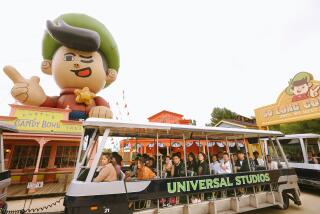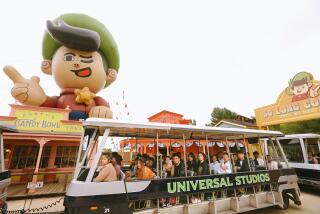Driver of Texas float is ‘traumatized’ by train crash, lawyer says
The driver of a truck involved in a train crash that killed four servicemen is a veteran himself and is “severely traumatized” by the event, an attorney representing the driver’s employer told the Los Angeles Times Tuesday.
Dale Andrew Hayden, 50, was driving the second float in Midland’s annual Show of Support veterans parade on Thursday when it was broadsided by a double-decker Union Pacific train going 62 mph through the West Texas city.
Since the crash, Hayden has been put under a physician’s care, said Douglas Fletcher, who represents Hayden’s employer, Smith Industries, an oil field equipment manufacturing company.
Hayden was not physically injured in the crash. He is an active reservist who served eight years in the military, Fletcher said.
“To be frank about it, he’s received some hate mail, which is sad,” he said.
Investigators with the National Transportation Safety Board are working with Smith Industries and Hayden’s doctor to schedule an interview. He is cooperating with the investigation and submitted a blood sample to police a day after the crash, an NTSB official said last week.
Hayden was driving the second of two floats in the parade, themed Hunt for Heroes. The trailer was carrying 12 veterans, their wives and two civilians on it when it was hit.
Police identified the dead as Army Sgts. Maj. Gary Stouffer, 37, and Lawrence Boivin, 47, who were pronounced dead at the scene; and Sgt. Joshua Michael, 34, and Sgt. Maj. William Lubbers, 43, who died later at Midland Memorial Hospital.
Sixteen people were injured. One person remained hospitalized Tuesday, Midland city officials said.
NTSB board member Mark Rosekind said the agency’s investigation will take at least a week.
The 16-person investigation team determined last week that the railroad crossing equipment was working at the time of the crash. According to data and video taken from the train, 20 seconds before the train reached the crossing, the intersection’s lights and bells began to alert drivers.
Witnesses reported one of the crossing arms came down and hit the parade float as it attempted to cross the tracks.
Show of Support organizers did not receive or apply for a parade permit for the Thursday event, according to Midland city officials.
“It’s significant to the investigation,” Peter Knudson, a spokesman for the NTSB, said without elaborating.
The agency has not determined yet if parade organizers notified Union Pacific. The on-scene investigation will continue through the rest of this week, Knudson said.
Families of the deceased and injured have begun hiring legal representation. Fletcher said he was contacted by the lawyer for Army Sgt. Richard Sanchez, who was on the second float.
“I was a bit disgruntled when I heard the NTSB suggest the system had worked as designed when they didn’t know how the system was designed,” Sanchez’s lawyer, Bob Pottroff, told the Times.
Pottroff suggests that the 20-second warning -- a federal minimum for train crossings -- wasn’t long enough for that particular intersection.
The NTSB said the equipment is maintained by Union Pacific, which is sharing information with the agency. Smith Industries, the city of Midland, and unions representing the truck driver and railroad employees are also sharing information with the agency.
The NTSB is scheduled to conduct a sight-line test Tuesday afternoon, where investigators will use a train and truck similar to the ones in the crash on the tracks and intersection to determine their visibility to each other.
ALSO:
Arrest made in beating death of zoo monkey
Indiana house explosion becomes homicide investigation
Hypnosis evaluation sought for sergeant accused in Iraq killings
More to Read
Sign up for Essential California
The most important California stories and recommendations in your inbox every morning.
You may occasionally receive promotional content from the Los Angeles Times.











